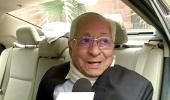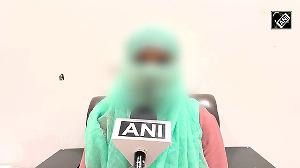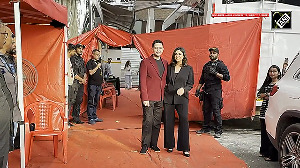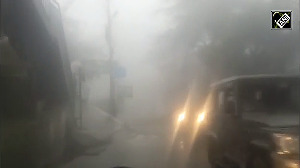Over the years, a noticeable unpleasantness began to develop between senior and junior, Sorabjee and Salve.
Salve gave credit, for his rise in the profession, to Nani Palkhivala, and not to Sorabjee.
This hurt Sorabjee, though he never admitted it.
A fascinating excerpt from Abhinav Chandrachud's Soli Sorabjee: Life and Times: An Authorized Biography.

Then Deputy Chief Minister of Maharashtra Chhagan Bhujbal, sanctioned the prosecution of Bal Thackeray under Section 153A of the Indian Penal Code (promoting enmity between different groups), a non-bailable offence. The atmosphere in the state was tense.
The police were worried that violence would break out if Thackeray were to be arrested. Against this backdrop, Union Law Minister Ram Jethmalani spoke to the press and said that the threatened prosecution of Thackeray was 'much ado over nothing' as it was a time-barred case (the statutory period of limitation for a court to take cognizance of a criminal case had expired).
He even hinted that the central government could dissolve the Maharashtra state legislature under Article 356 of the Constitution if the need arose.
In fact, it was Prime Minister Vajpayee himself who had asked Jethmalani to ensure that Thackeray was not arrested.
When the case came up for hearing before the Supreme Court on 21 July 2000, Chief Justice A S Anand was visibly upset. 'It is distressing', he said to Attorney General Soli Sorabjee, 'that comments are made by Cabinet ministers while a petition seeking implementation of the commission's report is pending before the highest court of the land.'
The judge was particularly upset over how the government had said one thing in its affidavit in court, but the ministers had said something entirely different in the press.
'Is there something like collective responsibility or not?', Chief Justice Anand asked, adding: 'Is [this] the way to run a civilised government? Telling the court something and playing to the gallery by saying something else to the public ..'
Sorabjee said nothing in defence of the two ministers. He was absolutely right to have done so. The ministers were wrong to have contradicted their own government's affidavit filed in the Supreme Court. Sorabjee told the court that he shared the court's concern over what the ministers had said.
Ram Jethmalani, however, reacted sharply. 'The learned Chief Justice should at least have realised', he said to the press, 'that he was making comments about a minister who knows his law as well as anyone else.'
Soon after making these comments, Jethmalani received a phone call from External Affairs Minister Jaswant Singh, who told him that Prime Minister Vajpayee wanted him to resign. He did so, and he was replaced by Arun Jaitley.
Livid over what had happened, Jethmalani gave interviews to the media and wrote a book in which he made several allegations against Sorabjee and Chief Justice Anand.

In the book, which bore the title Big Egos, Small Men, Jethmalani crudely said of Sorabjee that he had been too cautious during the Emergency, that he had been handpicked by Jayalalitha for the post of attorney general with a view to getting her cases transferred, that he had a 'cosy, quasi-paternal relationship' with Arun Jaitley and that he had been conspiring to have Jethmalani removed from the law ministry.
Jethmalani was unhappy over the fact that Sorabjee had not stood up for him in court when Chief Justice Anand had said all those things about him. He alleged that Vajpayee had picked 'a pliant attorney general' over a 'no-[nonsense] law minister.'

Jethmalani pointed fingers at Sorabjee for giving an opinion to the Hinduja brothers despite being the attorney general of India. One of the Hinduja brothers was implicated in the Bofors scandal -- in which a Swedish company, AB Bofors, was alleged to have paid kickbacks to top Indian politicians to secure a contract to sell weapons to the Indian Army. However, Sorabjee's opinion had nothing to do with the Bofors case. It concerned a power project that the Hindujas had set up in Andhra Pradesh.
Sorabjee had specifically taken permission from the Union law minister to give that opinion. Further, though it was being crassly hinted in the press that Sorabjee had received his fees in cash from the Hindujas for the opinion, this was not true. Jethmalani admitted all of this in his own book.
However, Jethmalani's grievance with Sorabjee's Hinduja opinion was that the decision to allow Sorabjee to give that opinion should have been taken by the entire Cabinet, not just the law minister. He also felt that the attorney general should not have done any private work at all, especially when it was against the government.
Sorabjee defended himself in the press and pointed out that Jethmalani had only raised all these grievances after being sacked as the law minister. Having entered public life, Sorabjee added, he was prepared for criticism but not vilification.

Sorabjee's tenure as the Attorney General in the BJP-led coalition government, between 1998 and 2004, was perhaps one of the most difficult and contentious phases of his career.
Among 192 reported cases that carried his name during that period, 84 per cent were in the Supreme Court.
Sorabjee's win-loss ratio went up substantially when he became the Attorney General. As a private lawyer in the 1990s, Sorabjee won 51 per cent of his cases. As the Attorney General between 1998 and 2004, he won 69 per cent of his cases. Once again, this does not suggest that Sorabjee's advocacy skills improved as a law officer. Perhaps the government was a more responsible client than his private clients were and chose to contest only those cases where the odds of winning were greater.
Perhaps as the Attorney General, Sorabjee had greater flexibility in deciding which cases to contest, and only picked those cases where the chances of winning were higher. Or perhaps courts in India tend to be more deferential towards the government, regardless of which dispensation is in power.
After all, when a law is challenged in court, the court begins by presuming that the law is Constitutionally valid, and it is for the petitioner to establish that it is not, even when violations of very important fundamental rights are involved.
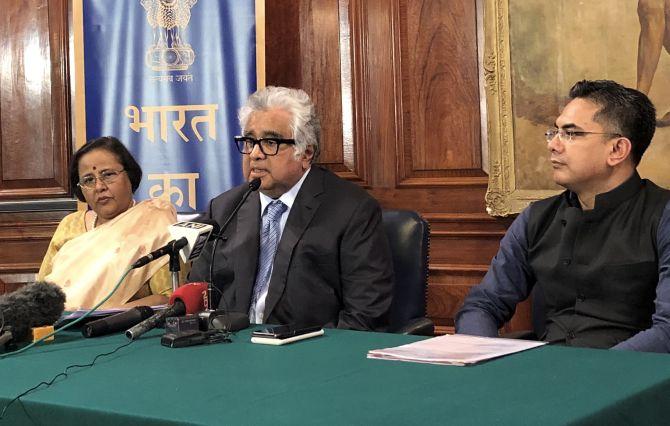
On 8 January 1999, the post of Solicitor General of India fell vacant when the incumbent, Santosh Hegde, became a judge of the Supreme Court. Law Minister Ram Jethmalani initiated the appointment of his junior, S B Jaisinghani, to the position.
Sorabjee opposed the appointment as he wanted his own junior, the brilliant lawyer Harish Salve, to be appointed to the position, so that he could have a 'congenial team'.
In choosing Salve, Sorabjee rejected another outstanding lawyer from Bombay -- Iqbal Chagla, his colleague in the chambers of Kharshedji Bhabha and Chief Justice M Chagla's son. Jaisinghani was eventually appointed as the Additional Solicitor General for India at the Bombay high court.
Over the years, however, a noticeable unpleasantness began to develop between senior and junior, Sorabjee and Salve. In April 1999, Sorabjee had openly said that he wished to retire the following year at the age of 70 so that he could move to a hill station and read to his seven grandchildren.
However, Sorabjee never retired. Perhaps Salve was disappointed that Sorabjee did not keep his word, since Salve would naturally have been the candidate to replace Sorabjee as the Attorney General.
Thereafter, unlike Sorabjee's other juniors, Salve did not attend Sorabjee's birthday parties or respond to invitations for social events. Salve gave credit, for his rise in the profession, to Nani Palkhivala, and not to Sorabjee.
This hurt Sorabjee, though he never admitted it. In public, however, Sorabjee maintained that Salve was one of his best juniors and that they were good friends at the Bar, though they may have disagreed on what line to adopt in some cases.
In 2002, for instance, in the Minority Educational Institutions case, Sorabjee and Salve took contradictory positions in their arguments. When Salve was asked about this, he reportedly said: 'I am arguing the case for the Government of India and not for Sorabjee'.
Many years later, Salve delivered a touching tribute to Sorabjee at a prayer meeting held in Sorabjee's honour after Sorabjee passed away in 2021.
Excerpted from Soli Sorabjee: Life and Times: An Authorized Biography by Abhinav Chandrachud with the kind permission of the publishers, Penguin Random House India.


